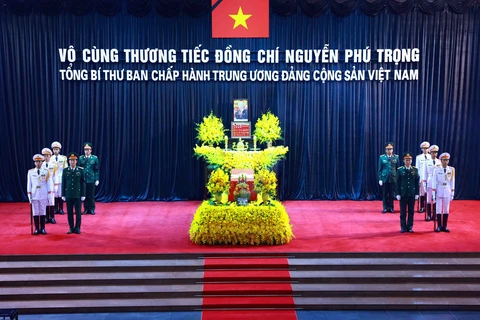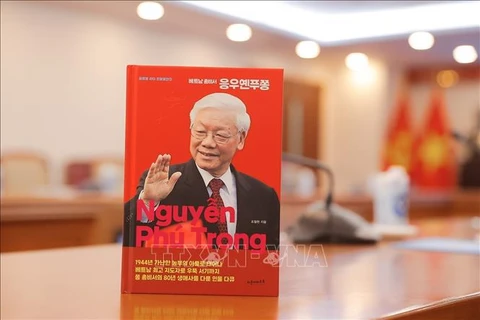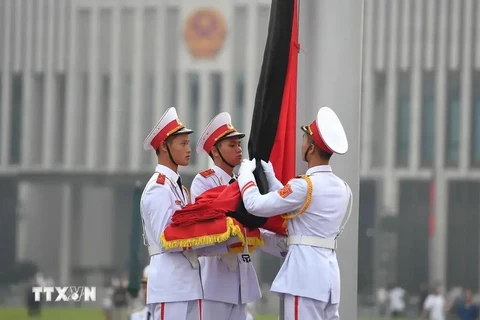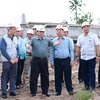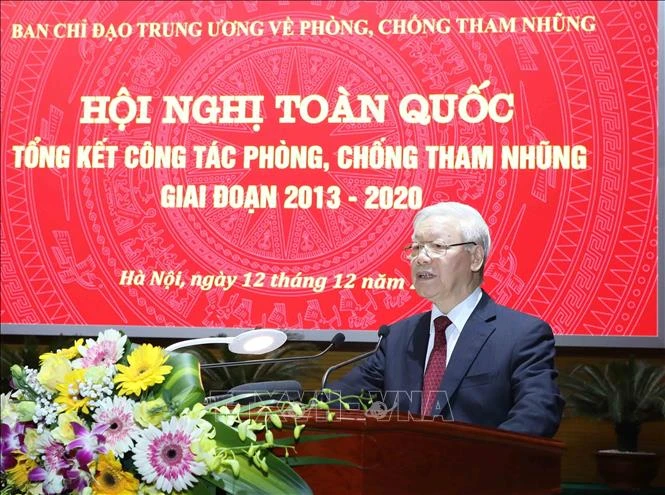
Singapore (VNA) – Party General Secretary Nguyen Phu Trong plays a highly important role in the stability and development of Vietnam, with the three legacies of the Party building and rectification, uprightness, and the “bamboo diplomacy” policy, which not only consolidate public trust in the Party’s leadership but also inspire future generations.
So said Dr Le Hong Hiep from the ISEAS-Yusof Ishak Institute, based in Singapore, while talking to the Vietnam News Agency (VNA) about the late leader’s contributions.
He said that the first legacy is the General Secretary’s role in the Party building and rectification, and the corruption combat. Under his leadership, the Communist Party of Vietnam (CPV)’s anti-corruption campaign has obtained considerable results in rectifying the contingent of Party cadres and purifying not only the apparatus of the administration but also other fields in society and economic sectors.
This has helped enhance people’s trust in the Party’s leadership and improve the efficiency and purity of the administration’s apparatus, thereby indirectly helping the economy to run more efficiently in the long term, the expert noted.
The second important legacy related to the first one is that the General Secretary set a bright example for the entire Party, administration, and people to follow. Throughout his time of leadership, he always showed himself as a highly upright person who took no interest in benefits for himself or his family and always stressed the role of morality and self-esteem of each person in serving the people and the Fatherland. His example will create a source of inspiration and a role model for all Party members, cadres as well as people to follow, thereby contributing to the country’s sustainable development, Hiep went on.
Besides, the General Secretary Trong made a considerable contribution to external affairs as seen in the “bamboo diplomacy” policy he emphasised in recent years. This policy has guided Vietnam to harvest especially important victories, particularly maintaining the balance in its relations with major countries and developing profound ties with the ones it has traditional friendship with.
Hiep perceived that the Party chief’s vision and approach on the foreign policy also left a big lesson for successive leaders about how to maintain the balance of Vietnam’s relations with other countries and continue promoting its role and position in the global stage so as to contribute to long-term development.
Mentioning the General Secretary’s dedications to the building and development of socialism in Vietnam and the world, Kyril Whittaker, a researcher on Vietnam’s history and politics and a member of the Communist Party of Britain (CPB), said the Party General Secretary was a fantastic theorist and a revolutionary leader of the Vietnamese people, whose contributions to the cause of socialism, not just in Vietnam but around the world, will be greatly cherished by future generations.
In a recent interview granted to Vietnam News Agency correspondent in the UK, Whittaker said the life and work of the General Secretary has ensured that Vietnam has provided future generations with a strong theoretical and practical foothold in the construction of socialism in Vietnam.

He told the VNA that General Secretary Trong had an expansive career across many different roles. A dedicated Marxist-Leninist, he had been a member of the Communist Party of Vietnam since 1967. He had studied in Vietnam at the Ho Chi Minh Academy of Political Science and the Soviet Union, refining his understanding of Marxism-Leninism and creating the seeds for his contributions towards Marxist-Leninist theory later in life.
The Party chief continued to contribute to the Communist Review and became its editor until 1996. This education, both ideological and practical, had prepared General Secretary Trong to deeply understand Marxism-Leninism and Ho Chi Minh Thought. From President Ho Chi Minh’s time to the Doi Moi (Renewal) period, Trong would study and take an active part in the debates around implementing Marxism-Leninism to Vietnam’s material conditions.
Internationally as well as nationally, his works such as the books “Renewal in Vietnam: Theory and Practice” and “Theoretical and Practical Issues of Socialism and Vietnam's Path to Socialism” educate their readers on the implementation of Marxism-Leninism to Vietnamese conditions, combating incorrect views about Doi Moi, and giving an astute historical materialist analysis of the development of socialism in Vietnam and the final year of the Soviet Union. These important books, alongside his many others, give a detailed insight into important questions which are studied around the world for their profound quality and depth of analysis.
Speaking about the General Secretary’s contributions to his country and people, the British scholar pointed out Trong was elected to innumerable positions in the Party, in each role showing a firm dedication to his work and a deep knowledge. In his various positions up until General Secretary of the Communist Party of Vietnam, Trong would make innovations of foreign diplomacy, combating corruption and degradation of revolutionary ethics and would become one of the most beloved leaders of the Vietnamese people. In his practical work, the Party chief often visited many provinces in Vietnam to meet the people, talk to the people and learn from the people, whether they be in their workplaces, in their houses or on their farms. He showed a deep interest in the people's lives and held steadfast the motto "the people are the roots".
Concerning foreign diplomacy, the Vietnamese Party leader fostered and developed a policy of bamboo diplomacy, whereby Vietnam maintained its defence policy of the “four no’s” whilst also making friends and expanding relations internationally, according to Whittaker. The spirit of bamboo diplomacy, catheterised by its “'strong roots and flexible branches” means that Vietnamese diplomacy could move with the changing winds of a turbulent world, increasing partnerships but remaining steadfast to its independence, security, ideology and people’s collective mastery, Whittaker said, believing such thought was drawn from Ho Chi Minh Thought. President Ho Chi Minh always sought to establish friendships with all nations, as long as this friendship was a partnership of equals where both parties benefit one another and do not interfere in each other’s affairs. Under Nguyen Phu Trong’s leadership, Vietnam was involved in many international groupings such as ASEAN, the non-aligned movement and the Mekong River Commission, and always ensured to uphold the spirit of proletarian internationalism. International friends of Vietnam will always remember that during the difficult time of COVID-19, Vietnam was a beacon of proletarian internationalism, sharing medical resources wherever there was need, including the UK, said Whittaker.
Speaking about Vietnam’s fight against corruption, the researcher pointed out General Secretary Trong ensured to combat wrong ideas of “transformation” and abuses of power. Throughout his presidency and secretaryship, corruption has been positively eradicated at all levels and the Party has upheld fully the core revolutionary ethics of Marxism-Leninism and Ho Cho Minh Thought.
Regarding economic achievements, Vietnam, under the leadership of General Secretary Trong, has continued its consistent trend of positive economic growth, Whittaker said, pointing out that the leader has ensured that Vietnam weathered many storms such as the COVID-19 pandemic to protect people and maintain a strong economy, which acts to serve the people.
Sharing the great loss of the people of Vietnam, Whittaker believed General Secretary Nguyen Phu Trong will be remembered fondly not just in Vietnam but around the world for his service to Vietnam and its people as well as his contributions to the cause of socialism around the world./.
